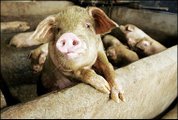
PARIS (AFP) - Researchers say they have created cloned piglets that are rich in omega-3 fatty acids, the oil that is prized as being beneficial to the heart. Omega-3 is mostly found in fish, but this supply is threatened by overtrawling and clouded by worries about mercury pollution, which accumulates in fish livers.
A team led by Yifan Dai of the University of Pittsburgh's School of Medicine transferred into foetal pig cells a gene called fat-1 that had been identified in a well-studied lab animal, a tiny worm known as Caenorhabditis elegans. The nucleus of pig eggs was then removed and substituted with the nucleus from these engineered cells, following the now-classic method of animal cloning that began with Dolly the Sheep in 1996.
The research's prime aim is to gain a better understanding of cardiac function, where hog and human are strikingly similar, the team reports on Sunday in the specialist journal Nature Biotechnology.



No comments:
Post a Comment